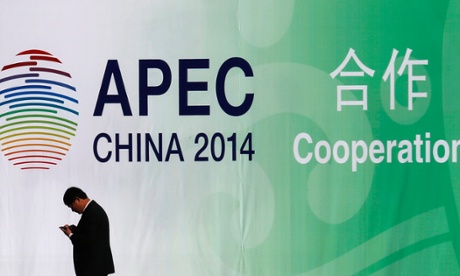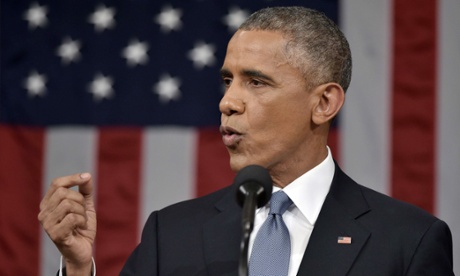The Australian government “led the charge” to ensure that the world’s largest trade deal, the Trans-Pacific Partnership, had adequate safeguards for environmental policy, the trade minister, Andrew Robb, has said.
The full text of the 6,000-page document was released on Thursday night, and already groups are expressing concern over the sparse attention given to climate change in the deal.
“It seems to me remarkable that the environmental chapter in the Trans-Pacific Partnership doesn’t even mention the phrase climate change,” University of Queensland intellectual property expert Matthew Rimmer told the ABC. “It’s kind of like Voldemort in the Harry Potter series, it’s a taboo phrase in the Trans-Pacific Partnership.”
But Robb has defended the deal, which has taken years to negotiate.
“In the environmental area, now it’s very explicit on those issues. It does provide safeguards, the best safeguards that have ever been provided in any agreement,” Robb told ABC Radio on Friday morning. “We [Australia] have been successful in leading the charge in getting significant carve-outs which preclude public policy in environment areas from being subject to litigation.”
Of particular concern to groups opposed to the TPP is the inclusion of a clause that makes it possible for foreign investors to sue governments if they think domestic laws are harmful to their investments.
Robb acknowledged that the clause, known as investor-state dispute settlements (ISDS), has been a sticking point, but said that Australia had negotiated a good deal.
“Australia has been at the forefront of tackling this issue, that the investor state dispute settlement mechanism is not used and abused by groups in other countries to ... litigate against particular countries,” he said. “It has been obvious all along where were the sensitive areas and I’m very confident that we have addressed those and protected issues that were of great concern to various groups within the Australian community.”
The Australian Free Trade and Investment Network is not convinced. The group has been sceptical of the ISDS clause, and of the TPP more broadly.
“The general ‘safeguards’ in the text [regarding ISDS] are qualified, and similar to those in other recent agreements which have not prevented cases against health and environmental laws,” coordinator of the network, Patricia Ranald, said. “They do not address the fundamental flaws of an unfair international tribunal system which has no independent judiciary, no precedents and no appeals.”
Ranald pointed to a legal dispute between tobacco company Philip Morris and the Australian government over plain packaging of cigarettes, which the company argues limits its right to intellectual property by removing its ability to brand its products.
Robb said that “predictable” opponents of the trade deal have not had a chance to properly study the expansive document.
“They don’t do themselves any favours, much less the nation, by jumping at shadows, peddling lines they’ve been peddling for years without a decent look at what’s been negotiated,” he said. “This has been negotiated over many, many years. We were aware from day one [of] the major areas of sensitivity [and] we have spent literally, you know, hundreds of hours on these areas.”
Labor would carefully analyse the text before committing to it, trade spokeswoman Penny Wong said.
“Legitimate concerns have been raised by many Australians about the content of this agreement. The government and Andrew Robb must explain the detail of the agreement, rather than attacking those raising concerns as anti-trade,” she said.
An inquiry by the joint standing committee on treaties would allow business, experts and the public to have their say on the deal, she said.
The Greens leader, Richard Di Natale, told reporters on Friday the text of the deal “confirms our worst fears”.
“We are handing over control to unelected, unaccountable foreign multinational corporations, to give them the power to sue governments for protecting peoples’ health and protecting the environment,” he said.
The TPP still needs to be ratified by the 12 countries that have reached an agreement on the deal: Australia, Brunei, Canada, Chile, Japan, Malaysia, Mexico, New Zealand, Peru, Singapore, the United States and Vietnam.
The Australian Chamber of Commerce and Industry has welcomed the deal, labelling it “important” and “far-reaching”.
“It has the potential to reduce costs across global supply chains, provide for predictable common rules for investment and services and open previously restricted markets for our goods and services,” the chamber said.
It argued that releasing the text before the deal is ratified allows stakeholders to express concern to parliamentarians before the deal is formally signed off.
“We congratulate the government and negotiators on their efforts to advance trade liberalisation across our region and hope that the presence of the TPP can inspire the governments of the world to continue embracing further liberalisation,” the group said.
Consumer group Choice wants the text of the document to be analysed by independent experts.
“The TPP will impact nearly every part of the Australian economy – it covers financial services, food, medicines and how our public services operate. It is too big and too important to simply wave through without an assessment of what we’re trading away,” campaign manager Erin Turner said. “Choice urges the government to commit to a full cost-benefit analysis by the Productivity Commission of the TPP before Australia signs on to the complex new rules in this hefty document.”
Ratification of the trade deal could hit a snag in the United States, as the country enters its campaign to elect a new president.
Barack Obama, who is about to enter his last year in office and has a lot riding on the deal, has strongly urged Congress to pass it.
He wrote an online piece outlining how the deal would affect American workers.
“The TPP means that America will write the rules of the road in the 21st century,” Obama said. “When it comes to Asia, one of the world’s fastest-growing regions, the rulebook is up for grabs. And if we don’t pass this agreement – if America doesn’t write those rules – then countries like China will.”
“That would only threaten American jobs and workers and undermine American leadership around the world,” he said.
The American nurses union, National Nurses United, has warned that patent rules favour big pharmaceutical companies and therefore limit the availability of cheaper generic drugs.
“That could be a death sentence for countless patients in need of affordable medications around the world,” executive director of the union, RoseAnn DeMoro, said.
Robb said that there was a “a lot of politics being played” in the US over the TPP, due to posturing ahead of an election. But he remained confident that the deal would pass Congress due to its importance to the US economy and its standing in the region.











